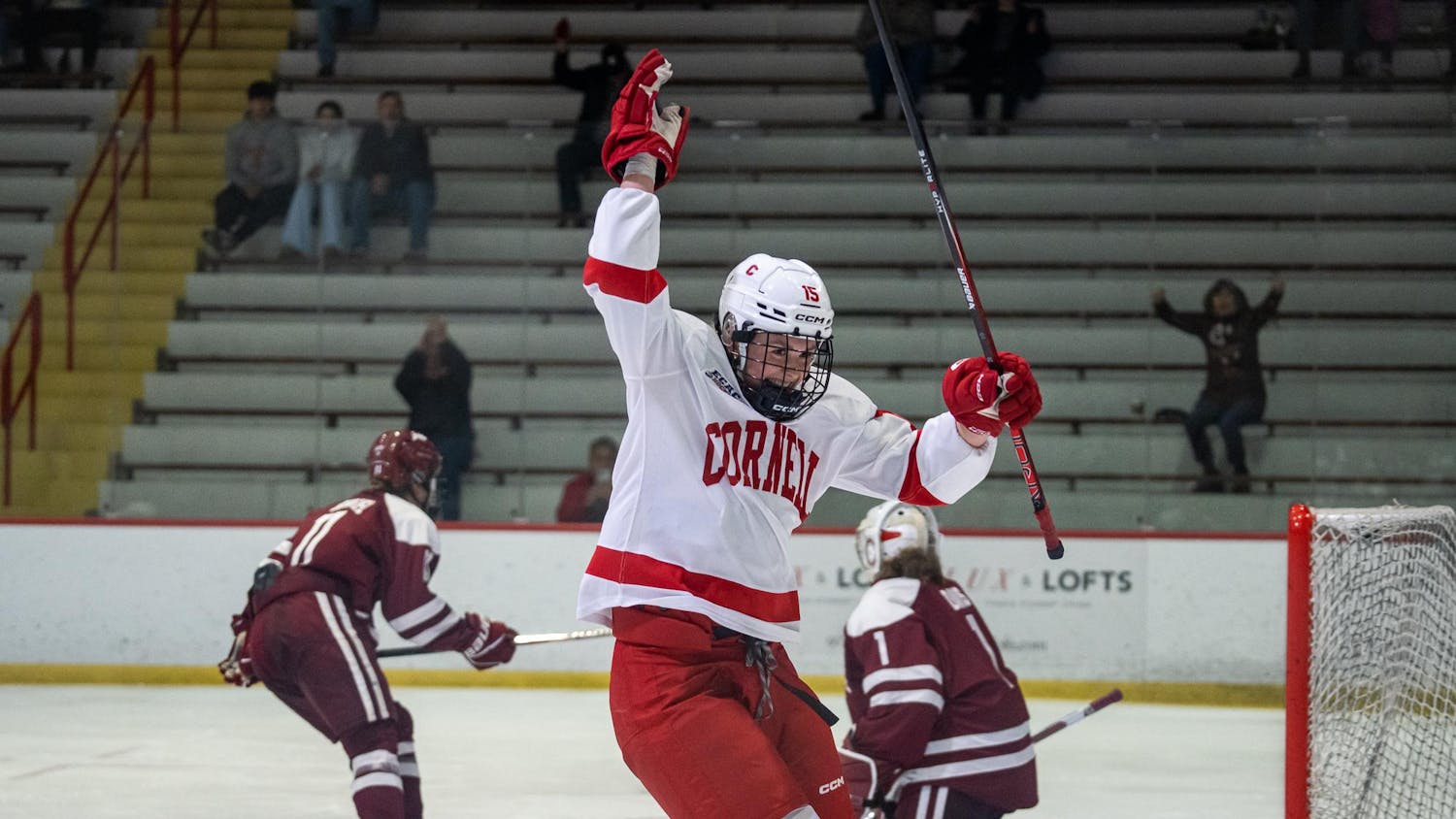Legendary former head coach of men’s lacrosse Richie Moran is among the most dynamic and colorful members of the Cornell family. Moran’s legacy has been cemented by the fact that the team’s head coach bears the title, “The Richard M. Moran Head Coach of Lacrosse,” currently occupied by Matt Kerwick.
In his 29 years at the helm, Moran led the Red to three national championships, compiling a 257-121 record. Moran is a member of several halls of fame including that of Cornell Athletics and U.S. Lacrosse.
In a recently-released autobiography, co-authored by Ithaca Times columnist Steve Lawrence, Moran discusses both his career at Cornell and the many ups and downs of his life before, during and after his tenure on East Hill. Entitled It’s Great to Be Here, the book’s chapters cover a spectrum of topics, many profound in their message.
The foreword is written by Jeremy Schaap ’91, an investigative sportswriter for ESPN who was Sports Editor of The Sun for part of Moran’s time as coach. Through their interactions, Moran left a palpable impact on the life of the then-aspiring sports journalist.
“When I think of the ultimate coach, I think not of [Bill] Belichick or [Scotty] Bowman or Phil Jackson — I think of Richie Moran,” Schaap writes.
In a personal touch, Schaap discusses his late father, Dick Schaap ’55, and his relationship with Moran. Schaap notes that spending time with Moran gave his father great comfort in the final years of his life, and that Moran’s greatness comes most of all from “his capacity for love, to love and be loved,” adding, “in my book, that’s the best kind of greatness.”
Schaap’s words echo a sentiment felt by nearly everyone who knows Moran. Chapter 18, entitled “Forever Connected,” features 25 testimonials from former players, colleagues and friends. Each story follows a similar structure to Schaap’s, and there are certainly others like them out there from people who have been personally touched by Moran’s warmth.
The book’s most powerful message comes in Chapter 17, “From the Shadows to the Light,” in which Moran discusses a period in his life during which he struggled with depression.
“The sun might have been out, but I didn’t recognize it as a bright day,” Moran writes. “My days were really dismal and dark.”
In an inspiring message, Moran discusses later in the chapter his recovery through seeking treatment for his mental illness, and encourages those in a similar place to do the same. “Seek help. Accept it. Realize it’s going to be a period of time in recovery,” Moran writes.
In typical Moran fashion, he goes the extra mile and offers to be a resource for those in need, saying “whoever’s reading this, if you feel in anyway I can help, I’ll be available 24/7.”
This personal message that Moran sends to his readers is an illustrative example of the kind of positive, caring person that so many of those people describe in their testimonials. “Richie Moran is a very special person,” wrote one friend. “His blend of warmth, humor and compassion is rare.”
It is through humor that Moran often conveys that warmth and compassion. Famous among those who know him for his witty pranks, Moran has long been an engineer of laughter. John Hanko ’86 recalled a story from his first away trip as a Cornell player. At a team dinner the night before a game at Dartmouth, Moran asked Hanko to ascertain via smell whether a pie had been spoiled. Hanko obliged, and Moran proceeded to put the pie straight into his player’s face.
Moran’s former players have countless stories like this, including a favorite among players from the 1987 and 1988 national runner-up teams. As the bus was preparing to leave for a pivotal match against a conference opponent, Moran sensed the tension among his players, and he made a move to loosen them up. After sending a young and unsuspecting John Wurzburger ’88 on a fool’s errand to retrieve a “bucket of steam,” hilarity ensued when he returned with a bucket full of boiling hot water draped with a towel to preserve the steam inside the bucket. Needless to say, the mood on the bus had been sufficiently lightened.
These anecdotes serve as perfect examples of Moran’s personality. And through this personality and his caring nature, Moran fostered tremendous relationships with his players, often describing his players like sons. Moran discusses in his book the kinds of emotional connections he had with so many of his former players. The most moving example of this is in Chapter nine, “Our Wild Irish Rose,” when Moran discusses his relationship with perhaps his best player, Eamon McEneany ’77, who was killed at the World Trade Center on September 11, 2001.
Moran discusses his delivery of McEneany’s eulogy. “It wasn’t a goodbye because I know we’re going to have an opportunity to get together again, but it was a chance to convey my feelings on behalf of my players, Cornell University and all the people who knew and loved Eamon.”
In the foreword, Schaap writes, “I’ve seen sorrow and I’ve been to many funerals, but I’ve never seen anyone as grief stricken as Richie the day he eulogized McEneany.”
Moran’s connection with his players stems from his passion and capacity for caring about others. This, coupled with the profound and moving chapters of his book, provide an excellent glimpse into the mind of a man who will be a part of the Cornell family forever.
Moran’s love for Cornell and its students knows no bounds. He told The Sun he hopes that students will read his book and gain a deeper understanding of the kind of place that Cornell is and what a deep history it has.
Asked whether he had a message for the students of Cornell, Moran said, “Enjoy every day with family and friends, and continue to make this a better world.”
After listening to Moran and reading this book, one thought remains constant: it truly is great to be here.

Brilliance, Humor and Compassion: A Window Into Richie Moran’s Inspiring Life
Reading time: about 6 minutes
Moran being interviewed after he won the 1971 championship — the first of three during his tenure.
Moran was inducted into the U.S. Lacrosse Hall of Fame 1983 for his playing days at Maryland.
Read More










